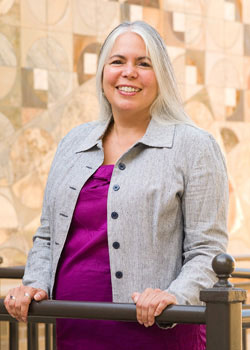Anisa Zvonkovic
2010 Texas Tech Integrated Scholar
C.R. Hutcheson Professor of Human Development and Family Studies;
College of Human Sciences
 In terms of service, sometimes you get leadership roles just by showing up, just by
fulfilling your commitments and being there. Because I do study work and family life,
I am keenly interested in making sure people have an appropriate balance and aren't
all-work, also that they do share their family load as well.
In terms of service, sometimes you get leadership roles just by showing up, just by
fulfilling your commitments and being there. Because I do study work and family life,
I am keenly interested in making sure people have an appropriate balance and aren't
all-work, also that they do share their family load as well.- Anisa Zvonkovic
What is your research objective/interest(s)?
I am trained to study close relationship development and stress of all sorts, but have focused my attention on the two main tasks of humans: to work and to love (first identified as such by Sigmund Freud!). My main specific area of research is how people navigate between their work and personal lives.
How do you feel your research impacts the globe?
Contemporary life requires us to live faster-paced lives, and the quickened pace clearly takes a toll on our personal relationships. I believe my current research projects are responsive to globalization, which has connected us and made more demands on more people (men and women, workers across occupations and countries) for work travel, thereby necessitating flexibility and accommodation in personal life. I hope my research helps people who are confronted with the difficult challenge of constructing a satisfying and vibrant personal life along with meeting work obligations.
Where do you get your inspiration?
It might be strange to say this, but I am inspired by people's everyday lives. Ever since childhood, I've been fascinated by other people: their conversations, their relationships, how they act, and what they feel. This curiosity about other people opens me up to explore new research ideas and to translating my work to policy and recommendations for change. I've had a lifelong passion for social justice, which provides a vision that inspires my choice of interdisciplinary academic inquiry (my teaching, my research, and my service). I'm also continually inspired by the creativity and energy of graduate students who are often uniting interdisciplinary areas at the forefront of methodological and statistical techniques.
What type(s) of service projects do you enjoy doing?
I do outreach work that assists people who lack power. My service includes working with the economically disadvantaged, working with individuals experiencing violence, and working in programs that empower women and girls. Sparked by my dedication to social justice, these areas of involvement extend beyond service projects to giving voice to individuals whose lives often fall into the margins of scholarly inquiry and institutional attention. I also enjoy serving my academic profession in a variety of ways such as editorial boards, special issues of journals, awards committees, and planning conferences and symposia.
What are you currently working on?
My current research project addresses jobs that require work travel and how they affect workers and their families. This multi-method project includes in-person interviews with family members, qualitative information, self-report standardized surveys, and the completion of about a month of daily diaries via Personal Digital Assistants. I'm proposing a new project addressing single people whose jobs require travel. I continue to collaborate with national and international researchers from a variety of academic disciplines on issues of work and personal life, as well as qualitative research methods. I am co-editing a special issue of the Journal of Family Theory and Review on qualitative methods. And, I am investigating two different regional projects: one involving women and work and the other involving Gulf Coast states, fisheries, communities, and family life. I am involved in multiple research projects of graduate students who always have creative ideas about avenues to pursue.
What advice do you have for new faculty members on balancing the components of an integrated scholar into their careers (academics, research, and service)?
For me, this integration occurs naturally, as I study balance between roles! Because balance is different across academic areas, my advice is most relevant for social scientists. I think new faculty members need to establish a research niche—in my academic area, it's not hard to find a unique interdisciplinary niche that is your's alone. When you do this, you open up to service areas in your discipline, and you get known for your particular combination (e.g., I go to conferences and am invited to speak as the only work/family expert, the only qualitative researcher, the only feminist scholar, etc.). In terms of teaching, keeping active in the basic undergraduate courses reminds us of the foundations for our inquiries. I have colleagues who do a great job recruiting for their research labs and for our graduate program through being excellent undergraduate instructors. Contributing to a vibrant graduate program enhances our research. When people ask about my research accomplishments, I always say that I couldn't do it without outstanding, engaged graduate students! It's important to be open to collaborations that can help with balance and to get to know colleagues who can show their ways of balancing the requirements of academic life.
Scholar Background
- Originally from Washington, D.C.
- B.A., Psychology and Religious Studies, University of Virginia (Echols Scholar)
- M.S., Human Development and Family Studies, Penn State
- Ph.D., Human Development and Family Studies, Penn State
Office of the Provost
-
Address
104 Administration Building, Box 42019, Lubbock, Texas 79409-2019 -
Phone
806.742.2184 -
Email
provost.communications@ttu.edu
